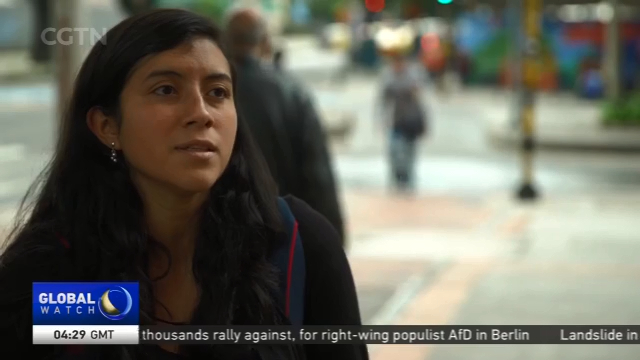
13:37, 28-May-2018
Colombia Elections: Examining why low voter turnout is a consistent trend in Colombia
02:13

According to AFP, the turnout was 53.2 percent. In a country traditionally plagued by voter apathy, concerns grow over the persistently low figures. Michelle Begue examines the issue.
It's election season in Colombia, but not all citizens here are enthusiastic.
LAURA ARCINEGAS BOGOTA RESIDENT "Because nothing ever changes in this country, because the candidates are the same, and you choose between the same corrupt people."
Colombia has a historically high abstention rate. In the last presidential election four years ago, a full 60 percent of eligible voters sat out. For many years, fears of violence amid an armed conflict and access were cited as reasons. Now, many analysts say politics and its politicians are excluding the masses.
PEDRO VIVEROS POLITICAL ANALYST "Politicians need to include the 60 percent who don't vote in the political discourse. Because instead, this benefits candidates who are radicals who have a discourse against the establishment and against the system."
MICHELLE BEGUE BOGOTA "Colombia is one of just a few countries in South America where voting is a choice. Some suggest the government should follow its neighbors' lead - and make voting compulsory."
But analyst Pedro Viveros says the issue is cultural that Colombians are not taught to participate. He points to countries like Costa Rica, where unofficial elections are held for minors - to help spark an early passion for democracy.
PEDRO VIVEROS POLITICAL ANALYST "In Colombia, we haven't fought for a participative democracy, people aren't asked to permanently participate, it is done sporadically."
Even the "Voto en Blanco" or blank vote, which can be used as a form of protest, is underused. If the blank vote were to win an election all candidates would be thrown out. But fake news campaigns aim to misinform voters.
VIVIANA NINO BOGOTA RESIDENT "I heard that those votes would be added to the candidate with the most votes. But then I heard that was a myth."
Michelle Begue, CGTN, Colombia.

SITEMAP
Copyright © 2018 CGTN. Beijing ICP prepared NO.16065310-3
Copyright © 2018 CGTN. Beijing ICP prepared NO.16065310-3